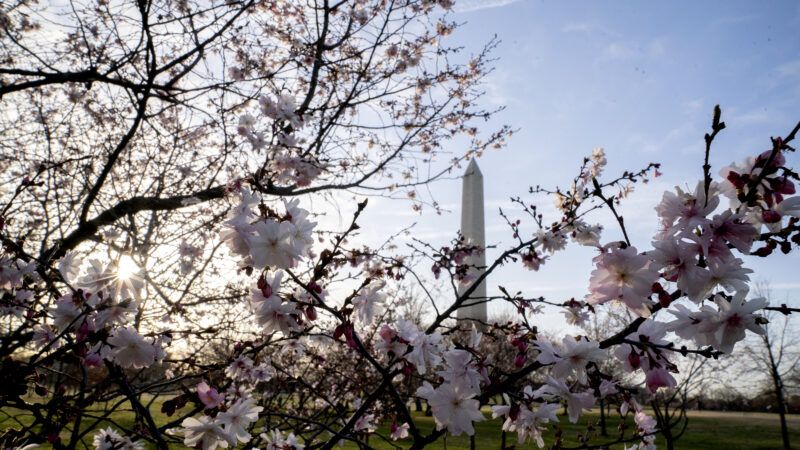Too Many People Admiring the Cherry Blossoms Is Not a COVID-19 Risk
The CDC is waging an unscientific war on the great outdoors.

In March of 2020, Washington D.C.'s National Park Service closed off access to the Tidal Basin during peak cherry blossoms season, due to concerns that the crowds would be a source of COVID-19. Perhaps that was defensible: The pandemic was just getting started at the time, and there was much that epidemiologists did not yet understand about this disease.
A year later, we know that COVID-19 does not spread easily outside. In fact, there has never been a confirmed super-spreader event that took place entirely outdoors. And yet D.C.'s park authorities have announced that they will shut down the Tidal Basin again this year.
"In accordance with guidance from the Centers for Disease Control and DC Health and in consultation with the National Park Service Office of Public Health, the National Park Service will limit all vehicular and pedestrian access to the Tidal Basin, East Potomac Park and West Potomac Park during the peak bloom period of the cherry blossoms," the city announced.
This makes little sense. While D.C. is not vaccinating residents as quickly as it should be, it is nevertheless the case that many people are now fully protected from COVID-19. The pandemic is, fortunately, winding down. Moreover, it's preferable for people to gather outside than to gather inside. Taking a walk down to the Tidal Basin to see the cherry blossoms is a very safe activity—especially if it's a substitute for congregating indoors.
Sadly, the CDC is ideologically disinclined to let people do things that make them happy, even if the risk of harm is low. People will need to get used to ignoring the CDC's overly cautious guidance (or better yet, realize that they have already spent most of their lives ignoring it).
It would probably help the public feel more at ease about going outside if social media sleuths would cease hunting for pictures of people at parks and beaches and then re-posting them with shaming messages. A serial offender on this front has been MSNBC's Joy Reid. On Monday, she retweeted a picture of a Miami beach party with the caption, "That literally looks like a microscopic image of a petrie dish."
The picture was from 2019. And in any case, people hanging out at the beach are not particularly likely to transmit COVID-19. On the contrary, closing beaches probably forces people to hang out in bars, restaurants, or their homes or hotel rooms—and that is where coronavirus spreads.
As the weather improves across the continental U.S., health authorities and shaming-inclined pundits must prepare themselves for the reality that the public is craving sunshine and socialization—and there's no compelling scientific reason to stand in the way. Let people go swim at the beach, walk through the park, and admire the cherry blossoms.


Show Comments (53)